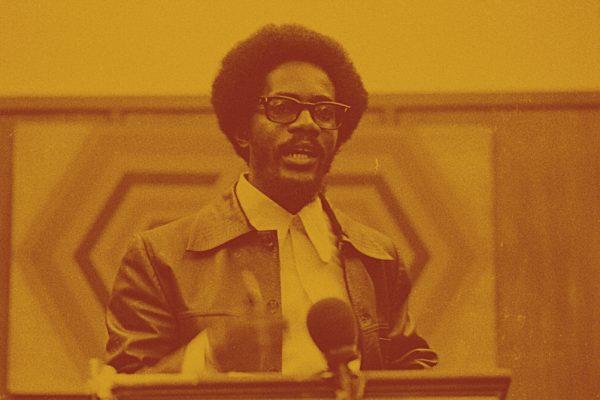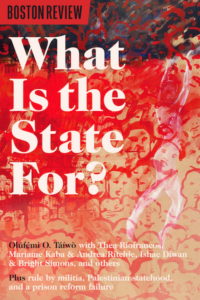Scanning the twenty-first-century political landscape in 2018, essayist Rana Dasgupta issued a provocation: “The most momentous development of our era, precisely, is the waning of the nation state.”
Dasgupta had in mind the global intensification of authoritarian politics, and the last six years have only exacerbated that trend. The same international system that failed to avert genocide in Bosnia and Rwanda is again allowing it in Gaza, Sudan, and with escalating risk in Ethiopia. Jair Bolsonaro has been voted out, but Vladimir Putin, Viktor Orbán, and Narendra Modi remain in office, and Donald Trump may yet win again. Meanwhile, Western and Central Africa have seen so much political upheaval that analysts have begun referring to a stretch of territory spanning the middle section of the African continent as the “coup belt.” And the entire planet has already hurtled past the 1.5°C of warming that this same international system agreed to prevent eight years ago in Paris.
The response from the global left to this set of developments has been equivocal. One cluster of tendencies views the state with a skepticism ranging from pragmatic fatalism to ideologically inflected antipathy. These orientations are born of political traditions that view the state and the state system as at best an outsider’s system, if not a primary antagonist. These tendencies have found expression in the street movements of the past decade and a half, from Occupy Wall Street and the Black Lives Matter uprisings in the United States to the Brazilian Free Fare Movement and the Yellow Vest protests in France.
Another set of views takes the battle over state politics to be of central strategic importance, whether as an offensive measure to wield its apparatus for progressive policies or as a defensive tactic in a war of position with colluding capitalists and the insurgent right wing. This set of views is reflected in the usual organizational subjects of the left—above all, workers’ unions and labor parties, but also institutions such as workers’ associations and tenants’ unions—and it has found expression in the agendas of a range of popular political figures, from Bernie Sanders in the United States and Jeremy Corbyn in the United Kingdom to Lula da Silva in Brazil.
World-systems theorist Immanuel Wallerstein has described a “two-step” strategy favored by the radicals of the twentieth century: “first gain power within the state structure; then transform the world.” This perspective, too, finds a present-day analogue in the ubiquity of calls for climate justice that are addressed to “policymakers”—which is to say, state managers and those in their social orbit. What’s missing from this picture is the fact that states themselves, beyond corrupt individual politicians, have institutional interests in maintaining both private and state-owned fossil fuel capacity and consumption. As Fred Block argued decades ago, any serious analysis of the state must account for the structural constraints that prevent state politicians from acting against the interests of the capitalist class. Today, perhaps the most significant such constraint is the immense political power that fossil fuel interests have amassed over the last few generations. This power helps to explain the popularity of “all of the above” policies among political elites despite the clear imperatives from researchers that limiting climate change means phasing out oil and gas—not just phasing in wind and solar.
Whether to march in the streets with Extinction Rebellion, phonebank for candidates with the Sunrise Movement, or blow up pipelines, as Andreas Malm proposes, is a tactical question. But the strategic imperative must be clear: nothing less than the total defeat of the organized political interests of oil, gas, and coal producers is necessary to make any other climate justice goals even a remote possibility. In what follows, I’ll defend a twenty-first-century version of “two-step” politics: first dethrone fossil capital; then transform the world.
Getting clear about this program requires getting clear about the different positions on the nature of the state that have driven political conflict within liberation movements for centuries.
In the early nineteenth century, many high-ranking officers in the newly independent Haiti’s armed forces favored joining the emerging Atlantic system and reinstituting a plantation-based economy. Dissenters among the peasant masses favored another strategy: opting instead to withdraw from the emerging Haitian state and engage in direct trade with the broader Caribbean economy.
Later that century, the split of the First International—a pioneering transnational organization that brought together communists, anarchists, trade unionists, and other leftists to advance class politics in their respective countries—owed much to a disagreement on how to relate to state power. The faction of Karl Marx and Friedrich Engels believed in contending for state power, seeing it as the engine of economic emancipation for the workers of the world. Opposite them, Mikhail Bakunin and allies held that any economic emancipation for the proletariat would come through the state’s destruction, not its seizure.
A similar clash figures in what Wallerstein calls the “antisystemic movements” that upended centuries of colonial domination in the twentieth century. On one side were political nationalists who aimed to replace colonial administration with self-determined states. On the other were cultural nationalists who viewed the apparatus of the state as an impediment to cultural change.
All these schisms reflect different attitudes toward the promise and problem of state power. But behind the conflict itself lay a consensus that the state could not be ignored—and that consensus, in turn, reflects the pivotal role the state played in these centuries. In particular, the capitalist world system emerged out of trade networks built by the exploration of imperial states in the fifteenth and sixteenth centuries. The military might that secured these trade networks emerged out of both state-sponsored piracy and navies under empires’ direct employ.
Whatever states are today, they are not what they once were—in part because, as Dasgupta chronicles, the state now faces serious competition for center stage in the organization of human society. Asset managers have accumulated a heretofore unprecedented share of human wealth; as of 2021, the two largest asset managers controlled enough wealth in assets to own the entire London Stock Exchange four times over. As Benjamin Braun and Adrienne Buller have put it, this means that “a handful of enormously powerful actors not only have decisive influence over the actions of the corporations in which they hold shares” but also enjoy “enormous power over the economy writ large”—an amount of power and influence that meaningfully competes with states’ ability to manage and shape economic life. Where capital and the state have managed a sort of merger, it is seldom under conditions congenial to the aspirations of the antisystemic movements of the twentieth century. More often it represents the capture of public institutions by private incentives. The Chinese Communist Party, however communist it is, is an exception to which the sovereign wealth funds of Norway, Angola, and Saudi Arabia are the rule.
The role of the state in debates within liberation movements was keyed to the functional role of state power in the centuries in which these movements made their stand. State power was decisive for various conditions of possibility for broader transformations: the balance of power between competing forces within it decides the level of repression and technological development that in turn determines the possibility and efficacy of radical organizing. The throughline between nineteenth-century “stagism”—the umbrella of thought that liberation would have to come in parts with a particular order—and its later “two-step” analogue is simply one way of taking conditions of possibility seriously. Some aspects of how we organize ourselves ought to be keyed to final principles or ideals, the world we hope to build. But we may find that the world as it already has been organized prevents meaningful progress toward that ideal—or, worse, that it is organized in a way likely to wrench back every inch of progress we make.
As soon as we are prepared to concede this dismal possibility, we are but a short distance from endorsing some sort of two-step strategy; we need only ask whether the steps we would take to make the world resemble our ideal are the exact same steps that would prevent the powers that be from halting our progress. If so, our politics can happily proceed in one step: “all” we need to do, so to speak, is win elections in the political system we already have. But if not—as historically has been the rule—we will need two. Indeed, Wallerstein concludes that the reason for the eventual victory of the “two-step” strategy in twentieth-century antisystemic politics was the inability of state-detractors to produce a viable alternative to a politics that took the centrality of the state seriously.
What stands between us and progress toward the world we want today? Increasingly, the climate itself. The very changes that are fueling extreme climactic events—record-breaking wildfires, Biblical floods and droughts—are also changing what counts as “normal” between these acute calamities. These less headline-inducing changes to average temperature directly affect the working conditions of farmworkers and logistics workers, fuel today’s climate-based displacement, and drive the sea level rise and hurricane risks that threaten some of the world’s largest population centers and thus help to ensure tomorrow’s mass displacements. Meanwhile, the ecological disasters that drain state budgets in countries like Guyana divert resources from potential alternative economic pathways and may well grease the wheels for the promises of easy and steady revenues made by fossil capital and other extractive industries.
This is all unfortunately compatible with the hope that the tide is turning on public opinion and elite consensus about the nature of the crisis. As the Zetkin Collective has noted in conversation with Perry Anderson, every year of climate inaction strengthens the argument about the need for ecological justice, all while eroding the “social capacities” to convert that understanding to sensible climate policy—much less to roll back the literal tides on the basis of new ecological seriousness. The gargantuan profits that fossil fuel companies have continued to consolidate have been put to work insulating their preferred legislation and legislators from serious democratic challenge—even to the point of fueling authoritarian politics worldwide.
It should go without saying that both the causes and effects of climate change are political and economic in nature. ExxonMobil and the U.S. military alike pursued institutional strategies that supercharged emissions not out of villain-like misanthropy but out of the banal motivations of profit-seeking and self-interested state competition that link our political era to every other. The motivations that drive fossil capital as a fraction of global capital are not essentially different from those that drive any other fraction of capital, nor do state officials in the world’s petrostates have entirely different motivations from those with more diversified economies.
But the extent to which climate change threatens the conditions of possibility for political organizing is not reducible to the schemes and machinations of corporations or state officials. Greenhouse gas emissions are a stock, not a flow: their ecological ramifications over the next few years will be tied much more strongly to recent decades of inaction than to any incremental policy victories the environmentally minded are able to eke out in the near future. The carbon and methane we have emitted in the past already drives the temperature changes that are displacing populations and worsening work conditions for farmworkers.
It is worth taking stock of the kind of difference this ecological reality ought to make to the prospects and priorities of people organizing in the twenty-first century. Though the idea of a “climate crisis” would have seemed foreign then, the nineteenth century was no stranger to political ecological thinking. Stagism emerged in some corners of the European left precisely around the idea of how to create the broad conditions for economic and political liberation in and across its countries.
According to “two revolutions” theorists among Russian Marxists, a first, “bourgeois” revolution was necessary pave the way to liberation. They expected this stage to usher in political changes that matched the interests and ideological fashions of the day’s bourgeoisie—including rights to free speech and assembly—alongside physical infrastructural changes that would make it easier for them to further develop the lines of commerce that had developed their political power in the first place. Furthermore, they argued that both of these developments, though emerging from the bourgeoisie’s own narrow interests, would lay the foundation for a second, “socialist” revolution: one in which rights and infrastructure would be repurposed by the people. If such a transformation succeeded, then the bourgeois revolution would turn out to have been a mere stage in the longer arc of transformation from a “backward” economy to a technologically and politically advanced socialist one.
This was by no means a form of debate isolated to the Russian Marxists. Writing in the decades following the twentieth-century wave of national independence movements in Asia and Africa, economist Samir Amin proposed “delinking” as a response to the chronic economic underdevelopment of the Third World, which he characterized as “the crisis of the world-system.” The newly independent states of the Third World, Amin argued, should delink from the capitalist world system by regulating external trade and capital inflows according to national level spending priorities rather than the dictates of global capital accumulation. These would include state-planned investments in national productive technologies and designed to promote egalitarian distributions of incomes between peasants and workers.
We do not need to relitigate centuries-old debates between factions of the Russian Social Democratic Labour Party any more than we need to take sides in decades old debates between cultural and political nationalists of the Third World. What is worth understanding about these debates is not which side was correct, but the nature of the disputes in the first place. Under what overall historical conditions are our ultimate goals achievable in the long term, and what must we do in the short and medium term to achieve them?
Today, there is no Russian Tsar or Portuguese Empire to direct our strategic focus toward toppling. Instead, it is the climate crisis that threatens to hand the reins of our historical conditions to the most implacable enemies of progress and put justice out of reach. Our living and working conditions are also our political conditions, and the rise of xenophobic right-wing movements represent one valve of the political economy that the pressures of rising temperature, sea level rise, and state competition over the energy economy may flow.
A twenty-first-century “two-step” politics—fit for purpose in this environment—would involve a close cousin of Amin’s view. But the delinking we must concern ourselves with is at the planetary scale: we need to delink the world economy from fossil fuels. In other words, we must achieve the energy transition.
This position is opposed from the outset to carbon reductionism—the technocratic fantasy that preventing the political crises to come consists simply in “going electric.” The global rise of price-competitive renewable energy, particularly solar power, is genuinely good news. But this will not, in and of itself, lead to the phaseout of fossil fuels. The prevailing definition of “energy security” used by developed countries—“a stable and abundant supply of energy,” as the European Union puts it—makes the intermittency of solar and wind power a political and technical liability, which opponents of energy transition have long seized upon. While technological breakthroughs in energy storage and transmission have made it possible to provide meaningful energy security even with intermittent energy sources, enacting this possibility would require serious, coordinated investment in public energy systems.
The prognosis for our climate futures depends not only on whether we eventually reduce emissions and other ecologically unsustainable practices, but at what rate. The shareholders of ExxonMobil and the rate of return on the assets managed by BlackRock and Vanguard depend on continued fossil fuel extraction, which they have made clear themselves. We need a “two-step” solution precisely because the forces aligned against broader transformative visions will be too well resourced and well positioned to overcome if we do not first undermine the loadbearing foundation of the status quo. We must first dethrone fossil capital so that we can control enough of our political and economic system to transform everything else.
The importance of the connections between the economic and political aspects of the capitalist system’s extractive bent have long been well articulated by the “degrowthers,” particularly those among them defending some version of “ecosocialism.” There is much to dispute about the precise manner of delinking from fossil fuels, as indicated by a well-worn series of debates about whether the ideal planetary economic system should be circular, steady state, “post-growth,” or “green growth.” But any system on which fossil fuels retain their present centrality—where fossil capital has not been politically defeated one way or other—is one that is incompatible with any broader sense of justice.
This twenty-first-century “two-step” strategy is likewise opposed to a picture of climate justice that confuses the moral parity of each of our social struggles with the temporal priority of those struggles. The fact that we want to progress toward justice along a variety of interrelated axes—race, gender, class, religion—can and must inform our ultimate goals. But we must not confuse analysis of the worthiness of struggles with the practical conditions under which they become winnable. It may be that racial justice, say, simply cannot be won in a world where fossil capital still reigns. Slavery was worth opposing for every moment of the millennia for which it stood as a major mode of production before the historical door opened to abolitionism. Likewise, World War II did not make national independence movements more justified than they had been in previous generations; what it did was make them infinitely more likely to succeed than their many failed counterparts in bygone and forgotten eras. The key question is what political conditions are compatible with the breadth of changes that we want to make. And developing an answer requires taking seriously the practical constraints of our time and figuring out how to change them.
Where does the “two-step” view of twenty-first-century politics leave us with respect to the state? Climate politics is no exception to general problems with the state system, from land grabbing to elite capture; on the contrary, it is broadly illustrative of them. The considerable tools of climate policymaking, in particular, have far more often been used to organize production in ways that cement fossil fuel extraction and our present ecological trajectory. So-called “public-private partnerships” often function to subordinate the interests of the public to those of the shareholders whose financial interests are represented at the bargaining table. Warren Buffett, for one, predicts that we are soon to see a resurgence of public power in part because the private sector is eager to offload the exorbitant costs of building climate resilient infrastructure onto public balance sheets, while avoiding the legal liability associated with climate disaster.
At least in principle, state-owned sovereign wealth funds ought to strike a balance between the potential revenues from fossil fuel extraction with the overall social costs. But even these have functioned as political bulwarks for continued environmental degradation and harmful extraction, a tendency that implicates progressive Norway just as much as it does the Kingdom of Saudi Arabia (despite efforts and promises within the former to divest from fossil fuels). Tight “collaboration” between private capital and the governments of states that depend on oil revenues risks aligning elite interests in favor of perpetually increasing emissions and away from energy transition.
These are real obstacles. Nevertheless, state politics is the likeliest path forward for successful contention with fossil capital. In general, the state’s decisions about what spheres of action are legal and open to the market do not simply make investments more attractive. Rather, they create the possibility of investment in the first place under the current state system. In this way, the decisions that states make—say, expanding, contracting, or eliminating permits to drill for oil, or mandating fossil fuel phaseouts—are a crucial aspect of the “market,” directing capital and social resources and shaping the trajectory of future politics.
In other words, states’ capacities are not just destructive, but creative. And building a new energy system that dethrones fossil capital and empowers the public would be a major creative project. The state’s ability to organize and plan production on a large scale would be of clear use for spurring and organizing massive energy transitions, and it could in the best cases represent a set of public alternatives to the current private finance–dominated approach to investment that puts asset managers and institutional investors in the driver’s seat of climate politics. That approach, sadly, is reflected in the signature climate policy advanced under the Biden administration; as economist Daniela Gabor has argued, rather than seek to build a “big green state,” it aims to “bribe private capital into fulfilling the certain policy priorities that are considered otherwise unachievable.”
A more promising way forward is being charted by energy democracy movements. A town in Arkansas installed solar panels to generate electricity for its schools, revenues for the school district, and linked this effort directly with hefty $15,000 increases to previously woefully underpaid teachers’ salaries. This is not a mere small-town phenomenon: the Los Angeles Department of Water and Power recently set a 100 percent renewable energy target. Helped along by some tireless activists, the entire state of New York recently passed a Build Public Renewables Act to phase out natural gas and build state renewable capacity with “gold-standard labor language” mandating union jobs on the projects. Public power, as a larger-scale goal and also as an ethos, could serve as a tactic to force a fraction of the ruling class into supplanting fossil capital and fulfilling its revolutionary task of decarbonizing the global energy economy and decommodifying public services—much in the way that previous generations of radicals aimed to force the European bourgeoisie into its revolutionary task of replacing tsardoms and monarchies, and the African bourgeoisie into its revolutionary task of toppling European empires.
Most of these goals are far less than planetary in scope; still they fit the “two-step” model. The curtailing of emissions anywhere—but particularly in high-emitting nations—affects the drivers of hurricanes and pollution elsewhere. In this vein, the People’s Agreement of Cochabamba, declared in 2010 in Bolivia, describes rich countries staying within their ecological limits as part and parcel of the “decolonization of the atmosphere.” But international politics is not without relevance, of course. A dozen states have already signed on to the Fossil Fuel Non-Proliferation Treaty, including Colombia and the Solomon Islands, bolstered by statements of support from the European Parliament and the World Health Organization. Similarly, debt cancellation initiatives might well expand the flexibility that state governments have to put state resources into the proactive defense of their populations from climate crisis rather than the proactive defense of their creditors from downside portfolio risks. Each of these involves the intricate machinery of the state system, and each goes well beyond what subnational or localist climate politics can hope to accomplish. These different scales of climate politics fit together as partners rather than alternatives.
Thea Riofrancos says:
“State policies and movement tactics should work in tandem.”
Could a twenty-first-century “two-step” politics avoid state politics altogether? It’s not impossible. Leftists around the world have rightly been inspired by the resilience and accomplishments of movements in Chiapas and Rojava to carve out niches of autonomy under the nose of the state system. For thirty years, the Zapatistas have experimented with autonomous municipalities and grassroots political structures outside of the purview of the Mexican state and in the midst of serious cartel violence. Meanwhile the General Council of the Autonomous Administration of North and East Syria has formally ratified a constitution that outlines ambitious political goals that include elimination of capital punishment and gender parity throughout all governing bodies.
But if the “two-step” point of view is correct, it is fossil capital that we must topple in this century, not the state system or any particular state within it. Withdrawal from the state or state politics is not obviously an answer to the question of how to delink the world economy from fossil capital, unless done in a way that involves alternative energy systems on a scale that would be atmospherically relevant. After all, the emissions of ExxonMobil and the Pentagon poison the air and raise the temperature in Mexico and Syria too. Those who are skeptical of political solutions involving contesting for or with state power directly ought to explain how that abdication fits into a political trajectory that ends in the political defeat of fossil capital on a planetary scale, not simply our successful refusal to be complicit with its reign.
The state we know today is rightly reviled. Its dawn was the age of colonialism, and its continued condition of possibility is a planetary system of arms dealing. Economic systems are maintained by nakedly inegalitarian decision-making structures; sovereignty is protected by an ever-expanding system of surveillance and violence, and borders are lined with razor wire. We deserve better, and we should want more. But it’s the getting more, not the wanting, that is the problem.
Even a world where the state takes the side of the broad public over the narrow interests of capitalists and investors is not one that necessarily results in the changes we want. After all, as economist Minqi Li has argued, the very political shifts that would align state incentives with public ones would generate massive capitalist backlash. Can a state that advocates “degrowth” policies survive the capital flight and investment strikes that have brought state governments to heel in the past? Li argues that, at minimum, public investment would have to rise to compensate for the withdrawal of private capital; in the long run, such a model may be totally incompatible with corporate profit, implying total public ownership of the economy.
As the examples of Norway and Saudi Arabia attest, the option of highly coordinated state investment is fraught with its own dangers: the prospect of easy returns may generate a conception of the “public interest” among state managers that locks in fossil fuel expansion. Active state intervention into twenty-first-century energy politics, whether via new nationalizations or comprehensive planning towards decarbonization, is no guarantee of a solution to the climate crisis. But it is not even a potential trajectory unless and until the state finds its interests aligned against those of capital’s private owners—and on the side of the people for whom it pretends to exist and from whom it derives its resources and presumed legitimacy.
Winning the battle to align the state’s interests in such a way would not deliver on justice for everyone or everything. It would not guarantee an end to racism, or sexism, it would not in and of itself undo centuries of colonial mismanagement; it would not in itself turn back the clock on generations of sedimented casteist or ableist stigma; it would neither abolish classes nor borders. But it would be a giant step—in itself a world-historical achievement, easily the task of a generation. And eventually, enough steps in the right direction get you to where you’re going.
Independent and nonprofit, Boston Review relies on reader funding. To support work like this, please donate here.

















